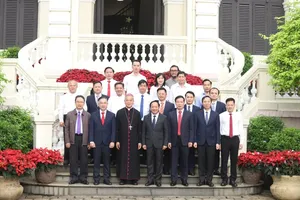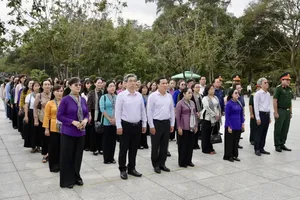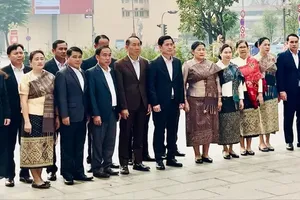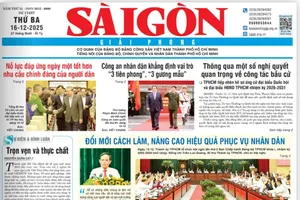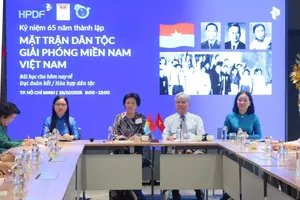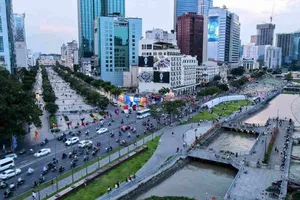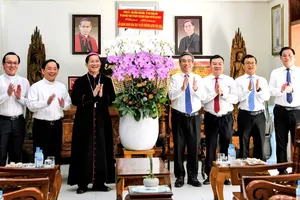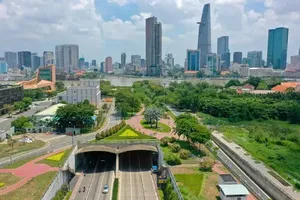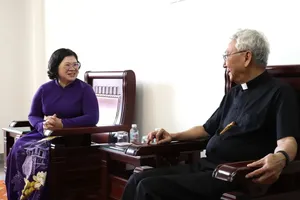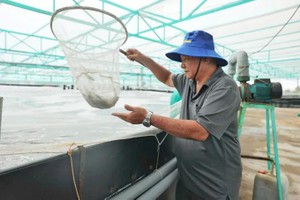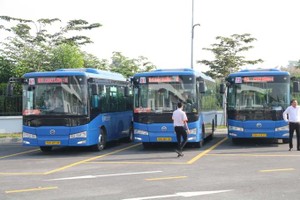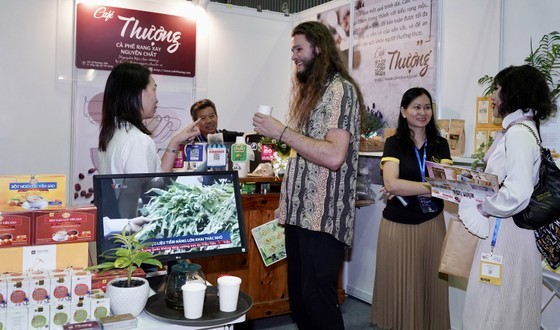 |
Visitors at the export fair |
The People's Committee of Ho Chi Minh City opened an export fair and forum in 2023 - the first of its kind in HCMC - which has attracted the participation of 200 businesses from many key industries of the city. In particular, the fair is considered an opportunity for businesses to expand their export market share when attracting more than 8,000 buyers from many countries around the world.
Downtrend continues
Speaking at the ceremony, Vice Chairman of the municipal People's Committee Vo Van Hoan, said that in recent times, the world context has many risks, instability, unpredictability, and global trade has declined posing a bad impact on Vietnam's import and export activities.
Since the beginning of the year, the total import and export turnover of our country has only reached US$230 billion, down 15.4 percent equivalent to $42.1 billion over the same period last year.
Of US$230 billion, export turnover reached $118.58 billion, down 12.8 percent. Ho Chi Minh City alone also recorded a decrease in export turnover of 21.1 percent. Orders in key export markets in Europe, the United States and China all fell sharply.
Talking more about this issue, Deputy Minister of Industry and Trade Do Thang Hai said that many businesses have been bumping into difficulties. Worse, Vietnam's key export markets such as the United States, Europe, Korea, and Japan are applying strict requirements on green products for exports to these markets. Vietnamese firms are facing an additional big challenge.
Director of MP Crafts Company Pham Van Thuan said that all businesses are encountering difficulties due to a series of measures to restrict imports formulated by importing countries. Luckily, the company's products are environmentally friendly handicrafts, so they are not affected by export taxes or technical barriers.
On average, each year before, the company's export revenue to the US market reached $4 million; however, from the beginning of 2023 to now, its revenue has decreased by 30 percent compared to the same period last year.
Many other enterprises said that although they have made efforts to improve their environmentally friendly production process, they are still worried because importing countries have formulated new green trade barriers.
Specifically, Vietnam’s wooden furniture enterprises must prove that the source of production materials must be planted forests. Moreover, agricultural products must be assigned an area code and prove that the land is not forest land. Especially, for energy-intensive industries such as iron, steel, cement, construction materials, and such, they must have a carbon-neutral solution.
These barriers have been applied by many markets around the world especially in Europe, the United States, Japan, and South Korea - which are the main export markets of Vietnam. In fact, Vietnam's export orders placed by partners in these markets since the beginning of the year have decreased by 60 percent.
Greening production - a vital factor
In the face of green trade barriers from developed countries, Mr. Vo Van Hoan disclosed that the city has actively built and deployed many groups of synchronous solutions while continuing to accompany businesses to remove difficulties and obstacles in the production and exports of goods.
First of all, the first export fair held in Ho Chi Minh City from May 25 to 28, with the participation of more than 200 key export enterprises of the city and 8,000 global buyers is considered as an opportunity for enterprises to seek orders and expand export market share.
Also at the forum, many economic experts suggested that the city, ministries and localities should focus on providing solutions to promote trade and service linkages and propose regional economic development strategies based on the strengths of each locality to serve the domestic and export markets. In particular, the implementation of regional linkages takes into account the factor of meeting green trade barriers and meeting international requirements on the circular economy in the current and upcoming time.
Notable, with the effectiveness of 15 free trade agreements (FTAs) that Vietnam has signed, compliance with the new rules of trade and investment and regulations on standards of quality and the environment is not only a responsibility in the implementation of agreements but also helps the country expand its export markets. Thanks to factors such as greening, sustainability, and environmental friendliness, Vietnam’s enterprises can enjoy tax incentives from importing countries.
To boost exports, Vice Chairman of Ho Chi Minh City People's Committee Vo Van Hoan suggested that the city's departments and agencies seriously study solutions and proposals to submit to the city. The city's leaders will base on agencies' and departments’ proposals to submit to the Central Government for the promulgation of strategic policies creating favorable conditions for the city to effectively exploit its potential and strengths.
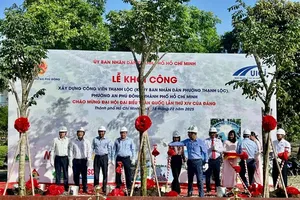
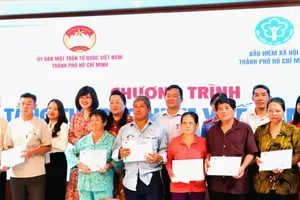
)

